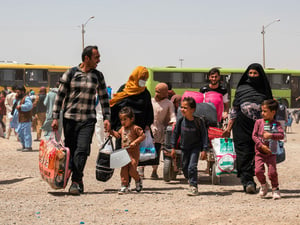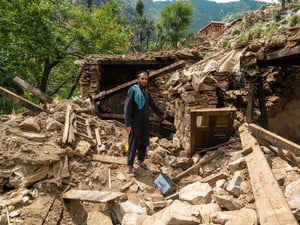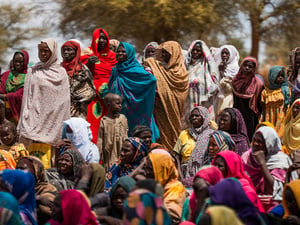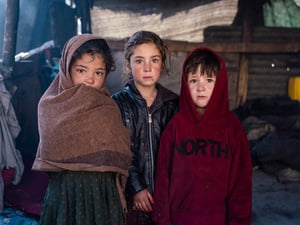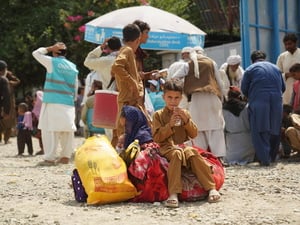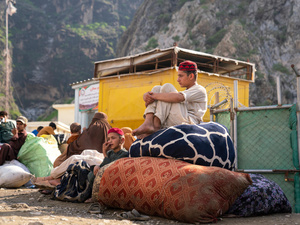UNHCR takes Afghan group return one step further - to Karachi
UNHCR takes Afghan group return one step further - to Karachi

Afghan elder Haji Ali Khan and his group before leaving Karachi for Afghanistan's Faryab province.
KARACHI, Pakistan, April 8 (UNHCR) - Haji Ali Khan could not wait to give up his grocery shop in Pakistan and resume life as a farmer in his native Faryab province in north-western Afghanistan. He even bought a tractor to cultivate the land. But he was not sure if he would have a roof over his head or water to grow his crops back home.
After a year of deliberation, the Afghan elder finally left for home on Tuesday, leading a group of 318 refugees, or 63 families, under UNHCR's first facilitated group return movement from Karachi in southern Pakistan.
Under this programme, UNHCR staff in Pakistan identify a group of refugee families who want to repatriate to the same location in Afghanistan but who feel that there is a particular obstacle that first needs to be addressed. The agency's field workers listen to their concerns and relay the matter to staff in Kabul for assessment. If the problem can be addressed, it is resolved with the help of local authorities and partner agencies. UNHCR then relays the news back to Pakistan so the refugees can decide if they want to voluntarily repatriate.
"Haji Ali Khan approached us earlier saying that his group was ready to repatriate but wanted his concerns of drinking water and shelter to be addressed. Now he has decided that he can't wait longer and would like to repatriate", said Mohammad Musa Khan, UNHCR repatriation assistant in Karachi. He has informed his colleagues in Afghanistan about the group's arrival and has asked the office to assist them with their concerns.
Tuesday's group was not the first case of facilitated group return from Pakistan. Last year, a group of 100 Uzbek families in Latifabad camp had asked UNHCR to assure their security on their way back to Mazar-i-Sharif. This was arranged with the help of the Afghan Ministry of Rehabilitation and Repatriation (MoRR). Another group of 38 Pashtun families from camps in Chaman had bought land in Kandahar province and asked UNHCR to help them install tube wells for water. They returned after UNHCR Kandahar installed three tube wells.
As a part of the facilitated group return process, UNHCR also facilitates go-and-see visits to Afghanistan by group elders of Afghan refugees in Pakistan. The visits provide a chance for refugees to assess the situation, talk to people and the authorities, and decide if they want to repatriate or not.
"No one likes to be displaced from his own land and people but this was written in fate for us to spend 15 years in different places of Pakistan. So we did," said Afghan elder Haji Ali Khan. "Now its time to return and we are all ready to embrace our land again. This is a historic moment for me and my group as we finally are moving to settle back in Afghanistan."
Joining the FGR group on Tuesday were another 74 Afghan families with 450 individuals from Karachi.
"We came to Pakistan when life became really tough in Afghanistan," said a man called Shah Wali. He said that the group lived in different parts of Pakistan before coming to Karachi. "We worked as labourers, drivers, street vendors and carpenters in Karachi, earning a good living. But now we are going back because Afghanistan is our motherland and have to go back at this stage of life."
Mohammad Yousif, 24, also went back with his family after 12 years in Pakistan.
"I am excited to return," he said. "I don't know how Kabul looks now but have heard that nowadays it's as busy as Karachi."
Tuesday's returns brought the total number of Afghan refugees going back from Pakistan past the 42,000 mark since the start of this year's repatriation on March 2. Last year, more than 343,000 refugees returned from Pakistan, including 35,400 refugees from Karachi.

